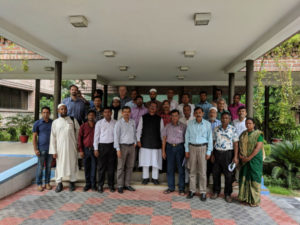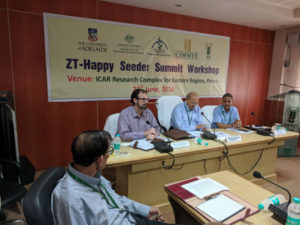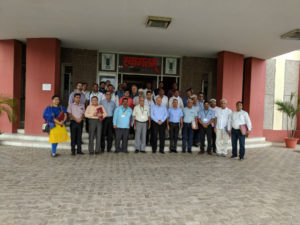
Workshop participants at RDRS, Rangpur, Bangladesh
The Centre for Global Food and Resources (GFAR) led project on accelerated adoption of Happy Seeder in Indian Gangetic Plains funded by Australian Centre for International Agricultural Research (ACIAR) has entered its final activity stage. Dr. Adam Loch and Dr. Jay Cummins recently visited Bangladesh and India to conduct three stakeholder engagement workshops at Rangpur (Bangladesh), Patna and New Delhi (India).

Dr. Adam Loch and Dr. Raj Paroda during the workshop discussion at Patna
For each workshop, experts were invited to comment on a draft policy briefing paper that will form the basis of our recommendations to national and state governments. The draft policy briefing paper comprised six pillars aimed at achieving zero burn from zero-till; which ties to the Happy Seeder product as a key zero-till product capable of handling extreme stubble conditions.

Workshop participants at ICAR, Patna
Many of the experts, who attended the workshops, highlighted the desperate need for this change, and that the time is ripe to engage with policy-makers. This project has provided much of the evidence in support of a strategic policy plan, which some dubbed the ‘Grey Revolution’ in reference to the smoke generated by stubble burning, and the ultimate objective of ceasing that practice among farmers.
Several innovative suggestions were recorded during the workshops, which resulted in changes to the policy briefing paper. It has now been reduced to four pillars including:
- Better awareness and sustainable entrepreneurial custom hire centre (CHC) businesses as a first step to adoption
- Achieving a vibrant manufacturing and retail support sector
- Subsidy and pricing strategies for demand-driven and long-term behavioural change; and
- Sustainable models for entrepreneurial CHC businesses

Dr. Jay Cummins and Dr. Adam Loch during workshop discussion in New Delhi
The briefing paper will now be showcased among key decision-makers and policy architects from India, Bangladesh, Pakistan, China, Australia and Nepal at the final project workshop activity to be held in Kathmandu, July 22-23rd. At this meeting, the team will seek to establish a series of regional collaborative platforms to enable and progress adoption outcomes, as well as initial discussions with policy-makers.
More information about this project is available on our website https://www.adelaide.edu.au/global-food/research/international-development/happy-seeder/

